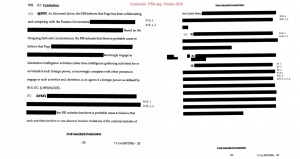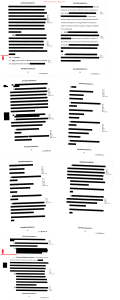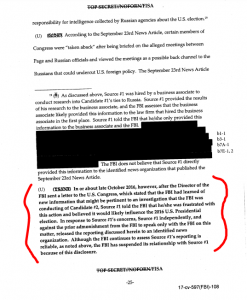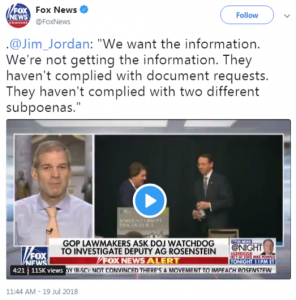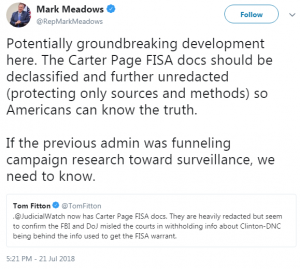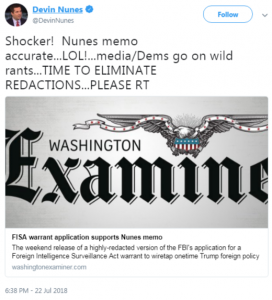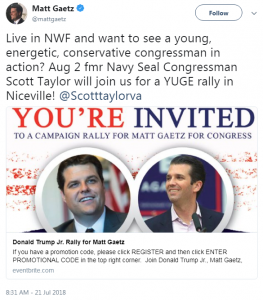As I disclosed last month, I provided information to the FBI on issues related to the Mueller investigation, so I’m going to include disclosure statements on Mueller investigation posts from here on out. I will include the disclosure whether or not the stuff I shared with the FBI pertains to the subject of the post.
When I wrote this post suggesting that Oleg Deripaska may have been in a position to make sure Christopher Steele’s Trump oppo research was filled with disinformation, a lot of people not only doubted that the dossier includes disinformation, but scoffed that even if it did it would matter. (See this post for more expert people talking about the possibility the dossier was seeded with disinformation.)
In his testimony to the House Intelligence Committee, Fusion GPS’ founder Glenn Simpson said that the Democrats used the Steele dossier in an effort, “to help [] manage a, you know, exceptional situation and understand what the heck was going on.” The same, we know from an endless series of Devin Nunes-led stunts to conflate the dossier with the FBI investigation, was true of the FBI.
The Democrats and the FBI used the dossier to figure out what was going on.
So to the extent information in the dossier was deliberately inaccurate — particularly in cases where it conflicted with publicly known or (given geographic location and known Steele network) knowable, more accurate information — it would lead the Democrats and the FBI to make incorrect decisions about how to prepare against or investigate the Russian attack.
And while I can’t tell whether the following examples arose from disinformation or some lack of due diligence or plain old hazards of human intelligence, all are examples where using the dossier to make decisions would have led the Democrats or the FBI to waste resources or act with less urgency than they should have.
How accomplished were the Russians at hacking
Steele claim, July 26, 2016:
In terms of the success of Russian offensive cyber operations to date, a senior government figure reported that there had been only limited success in penetrating the “first tier” foreign targets. The comprised western (especially G7 and NATO) governments, security and intelligence services and central banks, and the IFIs. To compensate for this shortfall, massive effort had been invested, with much greater success, in attacking the “secondary targets”, particularly western private banks and the governments of smaller states allied to the West. S/he mentioned Latvia in this regard.
Kaspersky Labs claim, April 21, 2015 (including links to older reporting attributing the attacks to Russia):
CozyDuke (aka CozyBear, CozyCar or “Office Monkeys”) is a precise attacker. Kaspersky Lab has observed signs of attacks against government organizations and commercial entities in the US, Germany, South Korea and Uzbekistan. In 2014, targets included the White House and the US Department of State, as believed.
The operation presents several interesting aspects
- extremely sensitive high profile victims and targets
- evolving crypto and anti-detection capabilities
[snip]
Recent CozyDuke APT activity attracted significant attention in the news:
Sources: State Dept. hack the ‘worst ever’, CNN News, March 2015
White House computer network ‘hacked’, BBC News, October 2014
Three Months Later, State Department Hasn’t Rooted Out Hackers, Wall Street Journal, February 2015
State Department shuts down its e-mail system amid concerns about hacking, Washington Post, November 2014
Note: FBI probably intended the DNC to consult to this report, describing “7 years of Russian cyberespionage,” when they first warned the DNC they were being hacked in September 2015, which would have also alerted the Democrats to the sophistication of Russian hacking.
Actions Democrats might have taken
The incorrect information, neglecting to mention known attacks on Germany’s parliament and US national security agencies, might have led Democrats to dismiss the persistence of the hackers targeting them.
What were Russians doing with social media and how social media was driving polarization
Steele claim, December 13, 2016:
[redacted] reported that over the period March-September 2016 a company called [Webzilla] and its affiliates had been using botnets and porn traffic to transmit viruses, plant bugs, steal data and conduct “altering operations” against the Democratic Party leadership.
Adrian Chen, The Agency, June 2, 2015,:
It has gone by a few names, but I will refer to it by its best known: the Internet Research Agency. The agency had become known for employing hundreds of Russians to post pro-Kremlin propaganda online under fake identities, including on Twitter, in order to create the illusion of a massive army of supporters; it has often been called a “troll farm.” The more I investigated this group, the more links I discovered between it and the hoaxes. In April, I went to St. Petersburg to learn more about the agency and its brand of information warfare, which it has aggressively deployed against political opponents at home, Russia’s perceived enemies abroad and, more recently, me.
Update: at 35:00 in this December 9, 2015 podcast, Chen describes the Russian trolls “only tweeting about Donald Trump and stuff … maybe it’s some kind of opaque strategy of like electing Donald Trump to undermine the US or something, you know like false flag kind of thing.” (h/t JL)
BuzzFeed, Hyperpartisan Facebook Pages Are Publishing False And Misleading Information At An Alarming Rate, October 20, 2016 (and virtually everything else Craig Silverman wrote in the months leading up to it):
Hyperpartisan political Facebook pages and websites are consistently feeding their millions of followers false or misleading information, according to an analysis by BuzzFeed News. The review of more than 1,000 posts from six large hyperpartisan Facebook pages selected from the right and from the left also found that the least accurate pages generated some of the highest numbers of shares, reactions, and comments on Facebook — far more than the three large mainstream political news pages analyzed for comparison.
[snip]
The rapid growth of these pages combines with BuzzFeed News’ findings to suggest a troubling conclusion: The best way to attract and grow an audience for political content on the world’s biggest social network is to eschew factual reporting and instead play to partisan biases using false or misleading information that simply tells people what they want to hear. This approach has precursors in partisan print and television media, but has gained a new scale of distribution on Facebook. And while it isn’t a solely American phenomenon — the British Labour party found powerful support from a similar voice — these pages are central to understanding a profoundly polarized moment in American life.
Actions Democrats might have taken
It’s hard to believe this December report is anything but pure disinformation. And, particularly given that it came just weeks before Manafort counseled Trump to discredit the investigation by discrediting the dossier, it’s easy to imagine that the point of this was to provide easily falsifiable information, seed politically and financially expensive lawfare, and protect Putin crony Yevgeniy Prigozhin’s contribution to the election operation.
In any case, intelligence about the publicly known trolling efforts earlier in campaign season might have led Hillary to pressure her close ally, Facebook COO Sheryl Sandberg, to take the threat more seriously — or at least to pay more attention to Facebook’s optimization program, both in her own and her opponent’s campaign. But a late report blaming a completely different company has only helped to discredit efforts to collect information on Trump’s ties to Russia.
What kompromat did Russia plan to leak on Hillary
Steele claim, June 20, 2016:
Asked about the Kremlin’s reported intelligence feed to TRUMP over recent years and rumours about a Russian dossier of “kompromat” on Hillary CLINTON (being circulated), Source B confirmed the file’s existence. S/he confided in a trusted compatriot that it had been collated by Department K of the FSB for many years, dating back to her husband Bill’s presidency, and compromised mainly eavesdropped conversations of various sorts rather than details/evidence of unorthodox or embarrassing behavior. Some of the conversations were from bugged comments CLINTON had made on her various trips to Russia and focused on things she had said which contradicted her current position on various issues. Others were probably from phone intercepts.
Josef Mifsud to George Papadopoulos, April 26, 2016, over breakfast in a London hotel: the Russians “had emails of Clinton … they have dirt on her … they have thousands of emails.”
Papadopoulos, May 10, 2016, over a drink to Australia’s Ambassador to the UK, in Kensington’s Wine Room, 2.5 miles from Orbis’ office:
During that conversation he (Papadopoulos) mentioned the Russians might use material that they have on Hillary Clinton in the lead-up to the election, which may be damaging.
[snip]
He didn’t say dirt, he said material that could be damaging to her. No, he said it would be damaging. He didn’t say what it was.
Actions Democrats might have taken
At least some of the very first documents Guccifer 2.0 released starting in June were obtained via the Podesta hack. Had the Democrats been worried about “thousands of emails” as kompromat rather than “bugged comments [and] phone intercepts … collated by Department K of the FSB for many years, dating back to her husband Bill’s presidency,” the Democrats might have prepared for an assault more directly targeting Hillary. At the very least, the Guccifer 2.0 releases would have alerted the Democrats that Crowdstrike’s advice — that usually such emails weren’t publicly released — didn’t apply in this case.
Who managed outreach to Russia
Steele claim, undated (after July 22, 2016):
This was managed on the TRUMP side by the Republican candidate’s campaign manager, Paul MANAFORT, who was using foreign policy advisor, Carter PAGE, and others as intermediaries.
Fusion GPS client Natalia Veselnitskaya, before June 9, 2016 Prevezon hearing attended by Simpson:
Around the end of May 2016, during a conversation with a good acquaintance of mine, being my client, Aras Agalarov on a topic that was not related to the United States, I shared the story faced when defending another client, Denis Katsyv, about how terribly misled the US Congress had been by the tax defrauder William Browder, convicted in Russia, who, through his lobbyists and his close-minded rank-and-file Congress staffers, succeeded in adopting the Act in the name of a person whom Browder practically hardly ever knew. I considered it my duty to inform the Congress people about it and asked Mr. Agalarov if there was any possibility of helping me or my colleagues to do this. I do not remember who of us was struck by the idea that maybe his son could talk about this with Donald Trump, Jr., who, although a businessman, was sure to have some acquaintances among Congress people.
[snip]
But upon arrival in New York in the evening of June 8, 2016, in my e-mail box I found a letter from a certain Goldstone, who notified me of the time and place of the meeting with Donald Trump, Jr. In this correspondance Aras Agalarov’s colleague, Irakli Kaveladze, who had been living in the United States for a long time and to whom I left my mail for contacts, was mentioned in the copy.
Veselnitskaya to Rob Goldstone, June 9, 9:24AM, requesting the inclusion of another Fusion client:
I am writing to ask you to pass by Mt. Trump my request to include our trusted associate and lobbyist Mr. Rinat Akhmetshin, who is working to advance these issues with several congressmen.
Paul Manafort to deputy of likely Steele contact Oleg Deripaska, Konstantin Kilimnik, July 7, 2016, of Deripaska:
If he needs private briefings we can accommodate.
Actions Democrats might have taken
On this point, the dossier proved absolutely correct. Manafort was managing the conspiracy with the Russians, at least until he was fired and his hand-picked replacement Steve Bannon took over. But the dossier’s focus on Carter Page — who was part of Russia’s outreach but a marginal figure — served to distract from the far more central figures that Fusion and its contractor Steele had no business missing: Fusion’s clients Natalia Veselnitskaya and Rinat Akhmetshin, and through them the President’s son and son-in-law, along with Manafort. And Steele contact Oleg Deripaska’s deputy, Konstantin Kilimnik.
Whether intentionally or not, the Page focus in the dossier distracted from the more central players, the ones who interacted directly with the candidate, the ones being run by Steele contact Deripaska.
Whether both sides were comfortable with ongoing operations
Steele claim, July 30, 2016, based off “late July” reporting:
The émigré said there was a high level of anxiety within the TRUMP team as a result of various accusations levelled agains them and indications from the Kremlin that President PUTIN and others in the leadership thought things had gone too far and risked spiralling out of control.
Continuing on this theme, the émigré associate of TRUMP opined that the Kremlin wanted the situation to calm but for “plausible deniability” to be maintained concerning its (extensive) pro-TRUMP and anti-CLINTON operations. S/he therefore judged that it was unlikely these would be ratcheted up, at least for the time being.
July 27, 2016, Donald Trump:
Russia, if you’re listening, I hope you’re able to find the 30,000 emails that are missing. I think you will probably be rewarded mightily by our press.
July 27, 2016:
For example, on or about July 27, 2016, the Conspirators attempted after hours to spearphish for the first time email accounts at a domain hosted by a third-party provider and used by Clinton’s personal office. At or around the same time, they also targeted seventy-six email addresses at the domain for the Clinton Campaign.
[Note: I’ve spoken with someone involved in the effort to repel this attack, and he described it as a new “wave” of attacks launched seemingly in response to Trump’s comments.]
Actions Democrats might have taken
Because the targeting here was Hillary herself and not the feckless DNC, the Democrats weren’t going to be lulled by this claim that Trump and Russia were laying low. But if the report were disinformation, it may have been intended to disavow the seemingly clear tie between Trump’s requests and GRU’s response.
Who covered up Manafort’s scandals/What Cohen really was doing with Russia
Steele claim, October 19, 2016:
According to the Kremlin insider, [Michael] COHEN now was heavily engaged in a cover up and damage limitation operation in the attempt to prevent the full details of TRUMP’s relationship with Russian being exposed. In pursuit of this aim, COHEN had met secretly with several Russian Presidential Administration (PA) Legal Department officials in an EU country in August 2016. The immediate issues had been to contain further scandals involving MANNAFORT’s [sic] commercial and political role in Russia/Ukraine and to limit the damage arising from exposure of former TRUMP foreign policy advisor, Carter PAGE’s secret meetings with Russian leadership figures in Moscow the previous month.
Starting on August 15, Rick Gates helps Paul Manafort hide their Ukranian consulting by lying to the press and DOJ’s FARA Unit; Deripaska deputy Konstantin Kilimnik would remain closely involved through the next year:
For example, on August 15, 2016, a member of the press e-mailed Manafort and copied a spokesperson for the Trump campaign to solicit a comment for a forthcoming story describing his lobbying. Gates corresponded with Manafort about this outreach and explained that he “provided” the journalist “information on background and then agreed that we would provide these answers to his questions on record.” He then proposed a series of answers to the journalist’s questions and asked Manafort to “review the below and let me know if anything else is needed,” to which Manafort replied, in part, “These answers look fine.” Gates sent a materially identical message to one of the principals of Company B approximately an hour later and “per our conversation.” The proposed answers Gates conveyed to Manafort, the press, and Company B are those excerpted in the indictment in paragraph 26.
An article by this member of the press associating Manafort with undisclosed lobbying on behalf of Ukraine was published shortly after Gates circulated the Manafort-approved false narrative to Company B and the member of the press. Manafort, Gates, and an associate of Manafort’s corresponded about how to respond to this article, including the publication of an article to “punch back” that contended that Manafort had in fact pushed President Yanukovych to join the European Union. Gates responded to the punch-back article that “[w]e need to get this out to as many places as possible. I will see if I can get it to some people,” and Manafort thanked the author by writing “I love you! Thank you.” Manafort resigned his position as chairman of the Trump campaign within days of the press article disclosing his lobbying for Ukraine.
Manafort’s role with the Trump campaign is thus relevant to his motive for undertaking the charged scheme to conceal his lobbying activities on behalf of Ukraine. Here, it would be difficult for the jury to understand why Manafort and Gates began crafting and disseminating a false story regarding their Ukrainian lobbying work nearly two years after that work ceased—but before any inquiry by the FARA Unit—without being made aware of the reason why public scrutiny of Manafort’s work intensified in mid-2016. Nor would Manafort’s motives for continuing to convey that false information to the FARA Unit make sense: having disseminated a false narrative to the press while his position on the Trump campaign was in peril, Manafort either had to admit these falsehoods publicly or continue telling the lie.
Oleg Deripaska deputy Konstantin Kilimnik asks Alex van der Zwaan to call Rick Gates to cover up Yulia Tymoshenko cover-up, September 12, 2016
When confronted with an email dated September 12, 2016, sent by Person A to van der Zwaan, the defendant again lied. The email was sent to the defendant’s email address at his law firm, though the Special Counsel’s Office had obtained the email from another source. The email said, in Russian, that Person A “would like to exchange a few words via WhatsApp or Telegram.” van der Zwaan lied and said he had no idea why that email had not been produced to the government, and further lied when he stated that he had not communicated with Person A in response to the email.
[snip]
Further, van der Zwaan in fact had a series of calls with Gates and Person A—as well as the lead partner on the matter—in September and October 2016. The conversations concerned potential criminal charges in Ukraine about the Tymoshenko report and how the firm was compensated for its work.
Actions Democrats might have taken
I’m particularly interested in how Deripaska contact Christopher Steele told a story that put Michael Cohen at the center of Russia pushback rather than Manafort himself, Rick Gates, and Deripaska deputy Konstantin Kilimnik, because if this is disinformation, it served multiple purposes (not all of which I include here):
- Distracted from Gates’ actions (and his ongoing ties with Kilimnik) while he remained a central figure on the Trump campaign and transition (effectively, ensuring that a high ranking campaign official with close ties to Deripaska’s deputy remained in place)
- Distracted from Manafort’s reported ongoing back channel involvement in the campaign
- Focused attention on Cohen in August, rather than his actions from January to June 2016 to negotiate a Trump Tower deal, something that probably had a more central role in the quid pro quo behind the election operation
- Shifted focus on ongoing discussions about a Trump Tower deal between reported Steele source Sergei Millian and Russian go-between George Papadopoulos
- Focused fall attention on Cohen on a Russian cover-up rather than on the sex worker hush payments he facilitated
Again, I don’t know that this line of Steele’s reporting is disinformation (though no evidence Cohen went to Prague has been substantiated). But if it was, it would have been a masterful distraction from a number of key threads that might have been lethal to Trump in the general election if they had become a focus.
In each of these cases, the disinformation would not so much disavow the existence of the election campaign. Indeed, in key respects — the centrality of Paul Manafort and Russia’s desire to end sanctions (though even there, the Steele dossier focused on the Ukrainian sanctions rather than the Magnitsky ones) — the dossier reported what actually happened, though both items were obvious. Rather, the disinformation would include grains of truth but incorrect details that would distract investigators and misinform Democratic decision-makers.
And all that’s before you get into how perfectly the dossier has served to discredit a very real, well-founded counterintelligence investigation and entangled Democrats and the press in expensive lawfare.

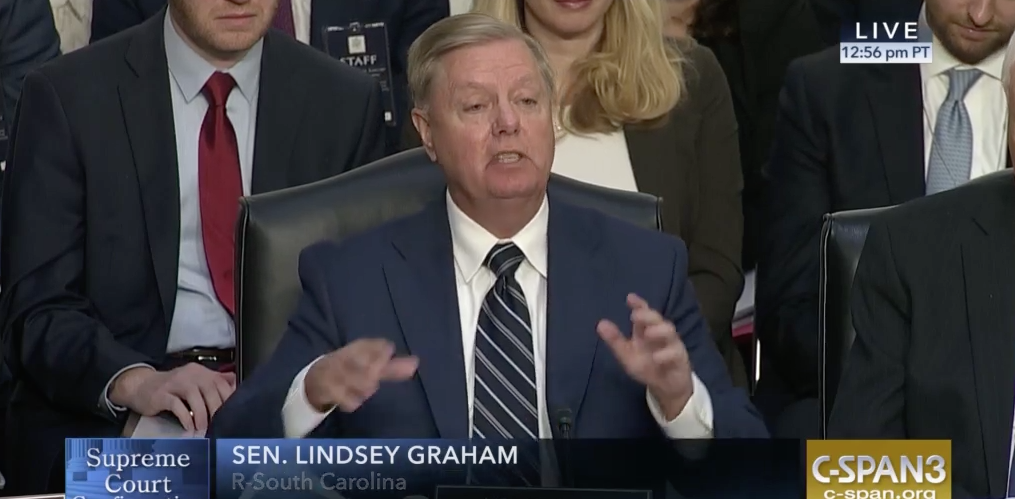
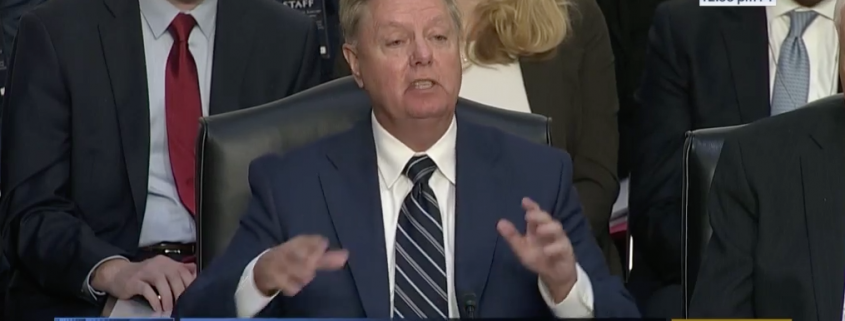
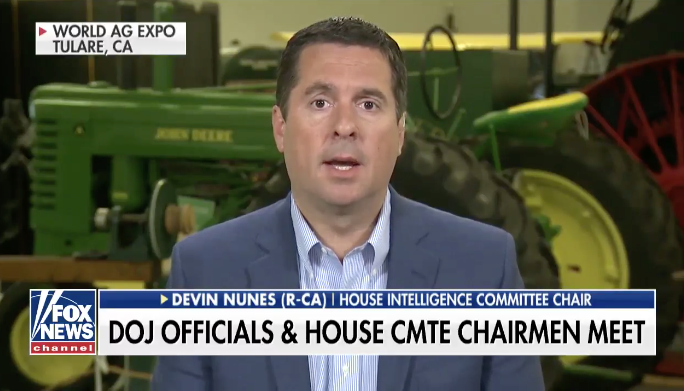










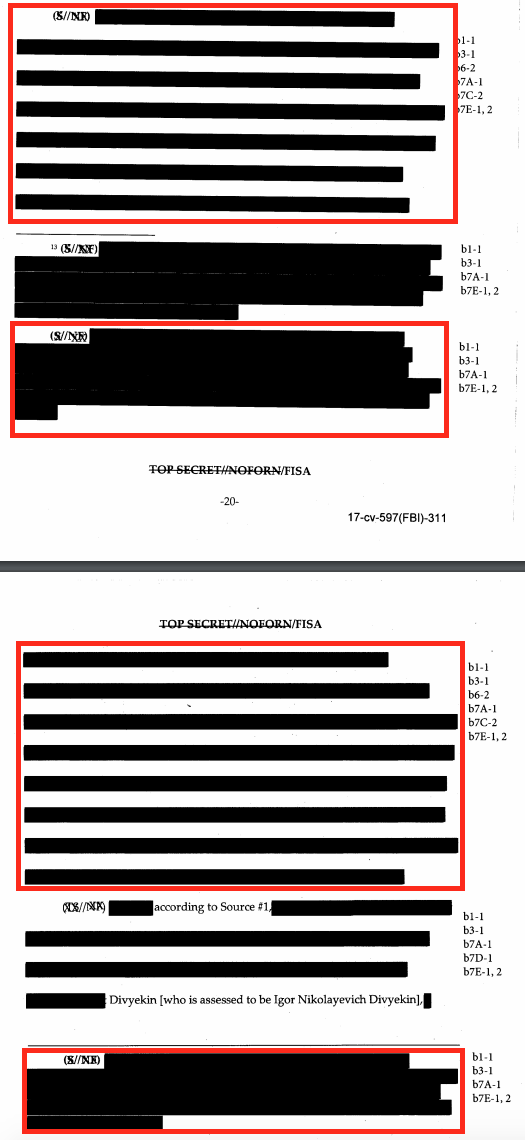




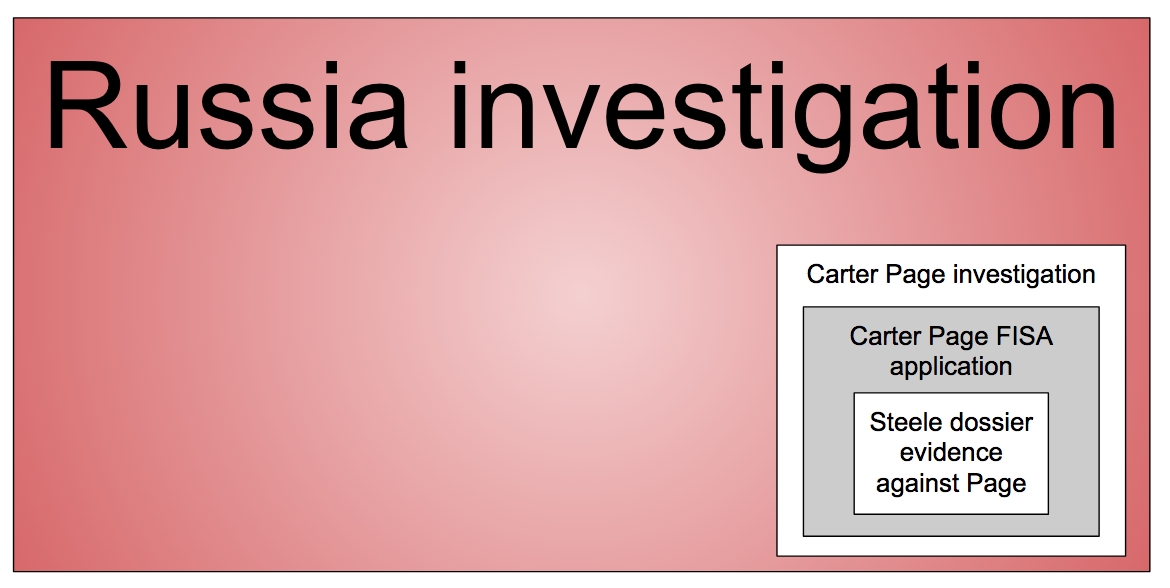

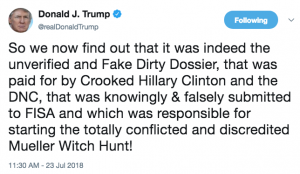
![[Photo: Emily Morter via Unsplash]](https://www.emptywheel.net/wp-content/uploads/2017/08/Question_EmilyMorter-Unsplash.jpg)

